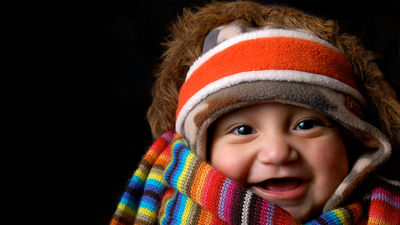Why does 'smile' fear people?

by Marcos de Madariaga
Usually, a smile is considered to give happiness to people, and when a close friend is laughing, it becomes warm feeling to me and makes me want to have a smile. However, there are certain situations where a clown raises a sharp laugh or a robot laughs suddenly, and a smile gives horror to a person. The science news site Live Science explains why people are fearful of smiling faces.
Why Is Laughter Sometimes Scary?
https://www.livescience.com/63941-why-is-laughter-sometimes-scary.html
Mr. Margee Kerr , a sociologist who specializes in research on 'fear' at the University of Pittsburgh said, "Many of the feelings of fear are based on discordance or infringement with our expectations and predictions." I will. In other words, fear is what happens when something goes against our expectations.
For example, many people recognize that "a child seems to be happy and pretty." If such a child does not show emotions that seem happy at all, and it has an inorganic expression, as if it is manipulated by something and is not cute, there is a discrepancy and discrepancy to children in mind Then people feel fear.
Likewise, things such as laughter and smile are recognized strongly linking with positive elements such as innocence and happiness. Mr. Kerr said, "Error messages or warnings can be issued" when someone smiles at a situation that is inconsistent with an ominous situation or about a non-positive scene. When someone is laughing while doing bad things, humans have a negative impression that they can not be trusted about that person, which is said to lead to feelings of fear.

by John Piercy
Thinking at the psychological level, "laughter" and "fear" are considered to be very similar. According to Mr. Kerr, both laughter and fear are "a state where the emotions are very high", it seems that it is not a mysterious behavior to laugh out after someone is surprised by something and shouting . "As soon as I know that my emotions are somewhat harmless by some factor, it turns into laughter," Kerr said.
Also, differences in how to catch the laughter appear depending on cultural differences. In the Western countries smiles are strongly associated with positive emotions, so it is recognized that the situation of danger to someone and smile at unfortunate circumstances are incompatible. Meanwhile, for people who were born and raised in a culture where laughter is not common, laughter launched in any scene may make you feel uneasy.
For now it is recognized that in a wide range of the world "smiles are positive things", but sometimes the meaning of a smile does not link with such a positive emotion in some cases. For example, there is a big difference between "laughing with someone by watching an interesting movie" and "laughing at a person who is inferior to yourself", the latter being recognized as a negative thing is.

by Steven Depolo
Also, the point that smiling subjects are human or not is a factor that makes a big difference in the impression that smile gives. People are fearful when laughing things such as robots and dolls that are generally considered not to have human feelings.
Around March 2018, Alexa, an artificial intelligence installed in Amazon's smart speaker, reported a lot of experiences "suddenly laughed out even though it did not call it in particular". As a result, Alexa suddenly laughed at the cause was said to be due to a mistake by asking something like "Alexa, laugh (Alexa, laughing)" command, but a lot of people burst out laughing abruptly He said he felt fear of Alexa.
Artificial intelligence like Alexa is not recognized as having a human emotion and those who saw the scene where Alexa laughed suddenly without having ordered anything were thrown into an unexpected situation It will be done. Mr. Kerr said that people felt fear because they did not understand why "Alexa is laughing."

by liboubou1
Related Posts:
in Note, Posted by log1h_ik







